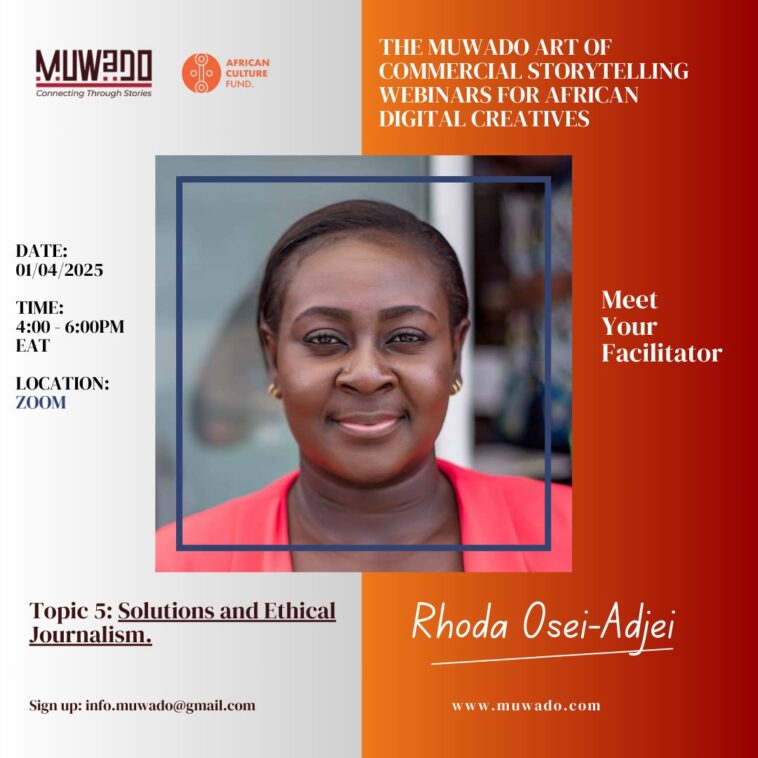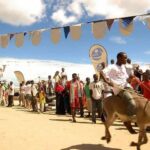Week 5 of the Muwado Commercial Storytelling Webinars happened on Tuesday, 1st April, with Rhoda Osei Adjei – an experienced broadcast journalist with a special interest in magazine productions based in Ghana as facilitator. She spoke on the topic; Solutions and Ethical Journalism
The meeting covered various aspects of journalism, including presentation techniques, solutions journalism, ethical considerations, and digital safety. Rhoda, an experienced broadcast journalist, led discussions on creative nonfiction writing, fact-checking, and the importance of planning in journalism. The session also addressed the challenges and opportunities in the digital age, emphasizing the need for integrity, continuous improvement, and adaptation to evolving techniques and tools in the field.
Next steps
- All participants to identify a problem in their area and write a solutions-oriented story following the principles of solutions journalism.
- All participants are to include their location when writing their solutions-oriented story to allow for fact-checking and verification.
- All participants are to post their assignments on Muwado before the next webinar.
Summary
Ethical Journalism Techniques in Writing
Rhoda led a session on solutions and ethical journalism. She discussed techniques for creative nonfiction writing, focusing on literary and narrative approaches. Rhoda emphasized the importance of using imagery, vivid descriptions, and dialogue in literary writing to create mental pictures for the audience. For narrative writing, she highlighted storytelling elements, character development, and scene building. Rhoda also stressed the importance of brevity, understanding the audience, and considering the platform when creating content. She explained how factors like timing, current events, and medium (print, digital, or broadcast) should influence the writing process.
Solutions Journalism: Key Principles and Examples
The discussion focused on solutions journalism and its key principles. Rhoda explained that solutions journalism is about reporting on responses to social problems, providing evidence of impact, and producing insights. She emphasized that solutions journalism stories should focus on specific responses rather than general theories or campaigns. Rhoda uses examples to illustrate the difference between solutions-oriented stories and other types of reporting, highlighting the importance of specificity, evidence, and potential for replication. She also clarified that solutions journalism is not about promoting political causes or individual acts of kindness but rather about addressing root causes of problems in a way that benefits the wider community.
Ethics in Content Production
Rhoda discussed the importance of ethics in content production, emphasizing the need for accuracy, fairness, and transparency. She highlighted the principles of seeking the truth, minimizing harm, and being independent in editorial positions. Rhoda also stressed the importance of fact-checking, source credibility, and transparency in maintaining trust and credibility. She encouraged the use of independent fact-checking tools and institutions to ensure the accuracy of information.
Digital Safety and Online Etiquette
Rhoda discussed the importance of digital safety and online etiquette. She emphasized the need for strong passwords, two-factor authentication, and regular software updates to protect against cyber threats. Rhoda also highlighted the importance of verifying identities, using proper reporting tools, and being mindful of data collection and usage. She stressed the need for online security, including the use of antivirus software and firewalls, and the importance of monitoring accounts regularly. Rhoda also emphasized the need for digital wellness, setting boundaries, and practicing self-care. She encouraged seeking support when needed and concluded by emphasizing the responsibility of protecting oneself and others in the digital space.
Fact-Checking in Journalism and Verification
Rhoda emphasized the importance of fact-checking in journalism and encouraged the use of independent institutions for verification. She suggested incorporating data journalists into newsrooms to provide more context and clarity to stories. Rhoda also advised against rushing to publish and to plan stories thoroughly, including fact-checking and verification. Concerns about the spread of misinformation on social media platforms were raised, but Rhoda reassured that fact-checking institutions are available to help combat this issue.
Planning and Fact-Checking in Journalism
Rhoda discussed the importance of planning in journalism, emphasizing that without a plan, a story will be disorganized. She explained the process of setting an objective for a story, drawing goals from it, and conducting research. Rhoda also addressed the issue of fact-checking during interviews, suggesting that a draft could be shared with experts for confirmation. An inquiry about governing laws addressing cyberbullying and digital safety issues, particularly for journalists was made. Rhoda responded that these are jurisdiction-specific and mentioned that in Ghana, one can report to the police after reporting the issue on the platform. She also mentioned that there are cybersecurity organizations that can be contacted.
Fact-Checking in Historical Writing
Rhoda emphasized the importance of fact-checking in historical writing to ensure accuracy and prevent distortion of facts. She suggested consulting historians, anthropology departments, and individuals who were alive during the event for a more accurate perspective. Rhoda also discussed the use of various techniques like reconstructions, animations, and cartoons to make historical stories more engaging without compromising their integrity. About Rhoda’s stringent approach to fact-checking, she explained that journalism is a game of credibility and once discredited, one loses their career. She advised those learning on the job to focus on these areas and continuously improve to build a successful career.
Digital Integrity and Personal Safety
Rhoda discussed the importance of understanding one’s purpose in the digital space, whether for fun or as a professional. She emphasized the need for integrity and adherence to journalistic principles, even in a digital age where fact-checking may be less rigorous. Rhoda also highlighted the importance of personal digital safety, recommending the use of appropriate tools and consulting professionals for advice.
Identifying Problems and Story Ideas
In the meeting, Rhoda discussed the importance of identifying problems and generating story ideas. She emphasized the need to be mindful of what solutions journalism is and what it’s not. Rhoda also shared her thoughts on the state of media viability, stating that it’s still a viable profession despite the challenges. She encouraged the participants to set themselves apart, be diligent, and keep up with the evolving techniques and tools of journalism. Rhoda also advised not to play small and local, but to look up to international media for inspiration.
The next session is on Tuesday, 8th April – PODCASTS AND AUDIO STORYTELLING
Namyalo Consolate is a Ugandan storyteller who shares her love of story through writing, voice-over, and Film. She has been in the media space for over a decade and currently works with Capital FM Uganda.
As a professional Voice-over Artist, she has worked with some of the most reputable brands and organizations worldwide, including CNN, CARE, WiDEFglobal, Climate Works Organization, World Resources Institute, UNDP, and the University of Oxford. She is committed to building communities through Audio, Visual, and Written
storytelling, empowering them to tell their own stories.
Consolate has been featured on MCI’s Media Viability Talks, The ConnectiveTea &AriMillenial podcasts, YAZA Africa, Goethe Zentrum Kampala & Echo Mindsets.She has also been awarded a certificate in Cultural Journalism from Africalia & La Cooperation Belge Au Development and one in Film Production from the American Film Showcase.
With this session, we want the participants to come out clear about;
• Podcasts and other audio storytelling formats
• Tools for audio storytelling
• African audio storytelling traditions
Training Community Group On Muwado
To make the most of this training, it is better if you are a member of Muwado. If you are not yet, you can register here: https://muwado.com/register.
Once you have created an account and are logged in, you can start sharing your stories here: https://muwado.com/create.
We have created a community group where we shall be discussing the lessons, posting assignments for feedback from our peers and working to ensure we are all learning together. When you are logged in, join the group here: https://muwado.com/groups/the-muwado-art-of-commercial-storytelling-webinars/
We have also recently created a Whatsapp Group due to popular demand, so send us an email at [email protected] with your contact, and we shall add you.
We’ll be sharing additional features of the platform that you can take advantage of over the course of the training. If you have any questions or challenges, you can reply to this email, and we will help you out.







NEXT: PODCASTS AND AUDIO STORYTELLING – Namyalo Consolate
https://muwado.com/the-muwado-art-of-commercial-storytelling-webinar-week-6-recap/
PREVIOUS: MEMOIR AND PERSONAL ESSAY IN NON-FICTION STORYTELLING RECAP – NEEMA KOMBA
https://muwado.com/the-muwado-art-of-commercial-storytelling-webinar-week-4-recap/